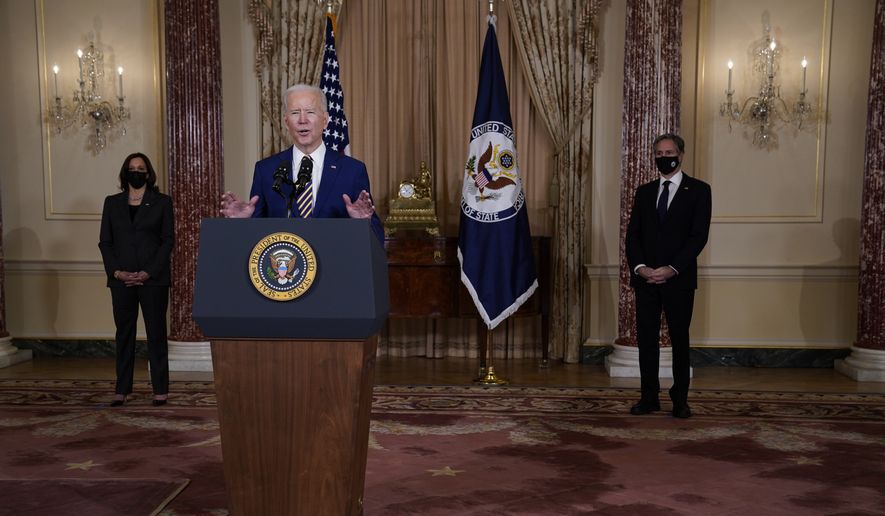President Biden vowed to revamp America’s global diplomatic engagement Thursday, outlining plans to keep the State Department and career diplomats “at the heart” of a push to reverse what he has framed as a withdrawal from the world during the Trump era.
In his first major foreign policy speech as president, Mr. Biden announced a halt of Mr. Trump’s order to pull U.S. troops from Germany and an end to Washington’s controversial support for Saudi Arabia’s bombing campaign targeting Iran-back Houthis in Yemen’s brutal civil war.
Traveling with Vice President Kamala Harris to the department’s C Street NW headquarters, Mr. Biden touted plans to dramatically raise the number of refugees allowed into the U.S. from fewer than 20,000 annually under Mr. Trump to 125,000 over the coming year.
“It’s going to take time to rebuild what has been so badly damaged, but that’s precisely what we’re going to do,” said Mr. Biden.
“America is back. Diplomacy is back. It’s the center of our foreign policy,” he said, citing a range of core Democratic party issues — from support for LGBTQ rights to countering climate change — as cornerstones of his administration’s approach.
“Defending freedom. Championing opportunity. Upholding universal rights. Respecting the rule of law. Treating every person with dignity,” Mr. Biden said. “That’s the grounding wire of our global power.”
The foreign policy reset planned by Mr. Biden and Secretary of State Antony Blinken has already gotten some early real-world reality checks in the administration’s very first days, including Russia’s crackdown on protests supporting jailed opposition leader Alexei Navalny and the ouster of Myanmar’s civilian government that the Biden administration quickly labeled a military coup.
On Thursday, Mr. Biden said Mr. Navalny “must be released immediately,” even as he praised his own administration’s early cooperation with the government of President Vladimir Putin to extend the New START nuclear proliferation treaty for five years.
“I made it clear to President Putin, in a manner very different from my predecessor, that the days of the United States rolling over in the face of Russia’s aggressive actions — interfering with our election, cyber attacks, poisoning its citizens– are over,” Mr. Biden said
Mr. Biden said his administration will counter Chinese competition “from a position of strength,” but also “work with Beijing” when it suits U.S. interests, such as on initiatives to counter climate change.
Mr. Biden made little reference to other adversaries. There was no mention in his speech of North Korea, nor of speculation his administration will seek new talks with Iran toward restoring the 2015 nuclear deal the Trump administration abandoned.
Despite cutting logistical and intelligence support for the Yemen campaign, Mr. Biden said the U.S. will still help defend Saudi Arabia, seen by the Trump administration as a bulwark of the regional alliance to contain Iran.
“Saudi Arabia faces missile attacks, UAV strikes, and other threats from Iranian supplied forces in multiple countries,” he said. “We’re going to continue to support and help Saudi Arabia defend its sovereignty.”
But the push to energize U.S. alliances with like-minded democracies was the major theme of the speech, saying he hoped “to begin re-forming the habits of cooperation and rebuilding the muscles of democratic alliances that have atrophied from four years of neglect and abuse.”
He also hinted, however, at a desire to engage with less friendly nations: Diplomacy “must also mean engaging our adversaries and our competitors diplomatically where it is in our interest and advances the security of the American people.”
Mr. Biden was clearly at pains to distinguish his approach from the previous administration, but some analysts say the charge of isolationism against Mr. Trump did not reflect reality.
“The United States isn’t back—it never left,” said Benjamin H. Friedman, policy director at Defense Priorities, a libertarian-leaning Washington think tank known for advocating against U.S. intervention overseas.
“It’s true the U.S. left the Paris Climate Accords and ceased cooperation with the World Health Organization. But the U.S. did not abandon any alliances — in fact, alliances grew, with new forces sent to the Middle East … and to Eastern Europe,” Mr. Friedman said in comments circulated to reporters. “NATO, and thus U.S. defense commitments, expanded. No new wars were started, but all of them continued, albeit with an overdue drawdown in Afghanistan.”
• Guy Taylor can be reached at gtaylor@washingtontimes.com.




Please read our comment policy before commenting.